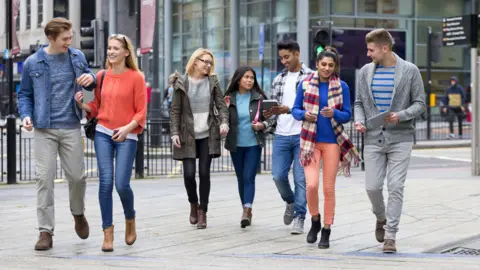Poor students 'lose on grade predictions'
 Getty Images
Getty ImagesUniversity admissions would be fairer if students applied after they knew their A-level results, says a social mobility charity.
The Sutton Trust says relying on predicted grades is working against talented, disadvantaged applicants.
This summer, almost three-quarters of applicants in the UK failed to achieve the grades forecast by their schools.
But the charity warns that poorer students are more likely to have their grades under-predicted.
Report author Dr Gill Wyness said it was vital that "disadvantaged students are able to play the admissions game on the same terms as their better-off peers".
Most predictions wrong
Under the present admissions system, universities make offers of places based on the grades predicted by teachers.
The Sutton Trust says that this is a system that favours more ambitious, better-informed applicants, from wealthier families and high-achieving schools.
This year, 73% of predicted grades for 18-year-old applicants turned out to be higher than their actual results - but by the time results are received many decisions will already have been made by universities and students about their offers and choices.
 Getty Images
Getty ImagesWhile the overall trend is for grades to be over-predicted, the charity says that for poorer applicants, grades are more likely to be under-estimated.
There are about 1,000 disadvantaged students per year who overachieve, compared with teachers' forecasts.
The Sutton Trust is warning that they could lose out by bidding for places in less-prestigious universities than their final qualifications could have achieved.
But the charity says that better-off applicants, even if they miss out on grades, still tend to get on to more sought-after courses.
Instead of relying on predicted grades, the education charity says that universities should begin testing ways of changing the admissions timetable so that university applications could come after final school results.
In particular, the trust says this would benefit poorer, brighter applicants, giving them more of a level playing field.
Personal statements
The Sutton Trust is also challenging the use of personal statements in the applications process, in which students write about why they are applying.
The charity describes them as a "further barrier to entry for poorer students".
There are warnings that disadvantaged students are less likely to have support in writing these essays and they will give a less favourable impression.
There have been previous attempts to change the timings for admissions.
But Universities UK says there are already opportunities for students to change after results are published.
"For those students who do do significantly better or worse than predicted, the clearing system operates on a post-results basis and allows applicants to change their mind and pick a different course or university," said a spokesman.
It also warns that disadvantaged applicants are "most in need of impartial information, advice and guidance", and if applications were made after they had left school, they would have even fewer schools "which is likely to make this situation worse".
Helen Thorne, of the Ucas admissions service, said: "The current admissions system works well.
"In 2017, over 70% of students were placed at their first choice. Those who want to apply post-results can easily do so," she said.
And such a shift in the admissions timetable would "require structural change to either the secondary or higher education systems".
The Department for Education said it was up to universities, as independent bodies, to decide on their admissions processes.
"Everyone with the talent and potential should have the opportunity to go to university, regardless of background," said a DFE spokeswoman.
